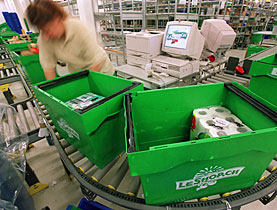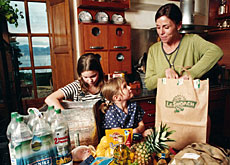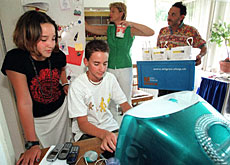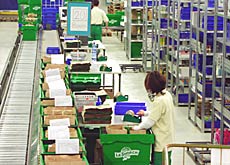Online supermarkets attract more shoppers

Switzerland's leading online supermarket is poised to cross over into profitability this year after ten years in business.
More and more people are going online to fill their shopping basket with groceries, bringing success to LeShop and its competitors, but this market segment still accounts for less than one per cent of Swiss retail sales.
LeShop.ch, which is a subsidiary of retail giant Migros, on Tuesday reported a record SFr92.3 ($82.7) million turnover for 2007 – up 43 per cent on the previous year. The online retailer has almost tripled its turnover since 2004.
Managing director and co-founder of LeShop, Christian Wanner, said in a company statement that online purchasing of food products in Switzerland grew by 33 per cent in 2007.
“Consumers are realising that doing their weekly shopping online improves their quality of life – they have more time and drive fewer kilometres by car,” Wanner said.
Convenient
Last year about 47,500 people clicked on LeShop to order food and other merchandise – a 41 per cent increase compared with 2006.
Among them was mother-of-two Myriam Schöpf from Schwyz in central Switzerland. “I only started using the website to order my shopping about four months ago but I’m a total fan now,” she told swissinfo.
“I live on the fourth floor and I find it very convenient that they deliver to the door. If I go out in the car with the two kids to do the shopping, it can take a whole afternoon. This way I can use my time much better.”
Schöpf buys large quantities of drinks, basic goods and baby supplies once or twice a month online. She spends about SFr200 on each order “to make it worth the delivery charge”.
Some potential customers are deterred by the minimum SFr13.90 delivery charge. swissinfo spoke to some supermarket shoppers in the suburbs of Bern.
“I have been on the site [LeShop.ch] to have a look but I thought the delivery price was too high,” one local woman said. “For me and my family it also doesn’t make sense because we need a lot of fresh products every day,” she added.
Others prefer the simple act of going to the supermarket to choose their products by hand themselves. One retired man told swissinfo why he would never consider using the internet to buy his groceries.
“I worked for 30 years in the IT industry and I had enough of computers. I know the internet shopping option exists but I am not interested, I want to come here where I can see everything,” he said.
Wealthy eco-friendly customers
Migros now controls a 90 per cent stake in LeShop after forming an alliance with the struggling online business in 2003, greatly boosting its reach and product range. It now sells about 8,000 articles online and ships up to 130 tonnes of groceries per day.
Coop, Migros’ main competitor, has its own online shopping and home delivery service called coop@home. It sold online goods worth Sfr45 million in 2006 and is also showing strong growth in customer numbers and turnover.
A spokeswoman for Coop told swissinfo that online shopping was an important niche for the company. coop@home attracted some 21,500 new customers last year.
“The market was worth SFr140 million in Switzerland last year and we estimate that demand for online grocery shopping will increase to SFr300 to SFr400 million over the next five years,” she said.
It is unsurprising that more affluent households tend to buy more online. According to a consumer survey carried out in November 2007, online shopping is more popular in high-income brackets.
Although 84 per cent of Swiss households have internet access, just 30 per cent of people have made purchases online. However, this rises to 43 per cent for higher-income shoppers, the poll by GS1 Schweiz and Accenture showed.
Online shoppers also have the satisfaction of knowing that this consumer behaviour is more environmentally friendly.
A study in 2006, which compared LeShop delivery by the Swiss Post with individual supermarket shopping, found that energy consumption was reduced by two thirds.
LeShop was created in October 1997 near Geneva. In September 2003 it formed a joint alliance with Switzerland’s biggest retailer, Migros.
The company has distribution centres at Bremgarten, canton Aargau, and Ecublens, canton Vaud, and employs 167 staff (October 2007).
It is Switzerland’s leading internet supermarket with 65% of online sales and 41,500 regular customers.
The company recorded a turnover of SFr92.3 million in 2007 – three times that of 2004.
In 2006 Coop, Switzerland’s second-biggest retailer, sold online goods worth SFr45 million (+38% on 2005).
Customers can choose from 8,000 articles at LeShop, versus 10,000 at Coop.
On average, LeShop customers spend SFr213 on their order.

In compliance with the JTI standards
More: SWI swissinfo.ch certified by the Journalism Trust Initiative




You can find an overview of ongoing debates with our journalists here. Please join us!
If you want to start a conversation about a topic raised in this article or want to report factual errors, email us at english@swissinfo.ch.